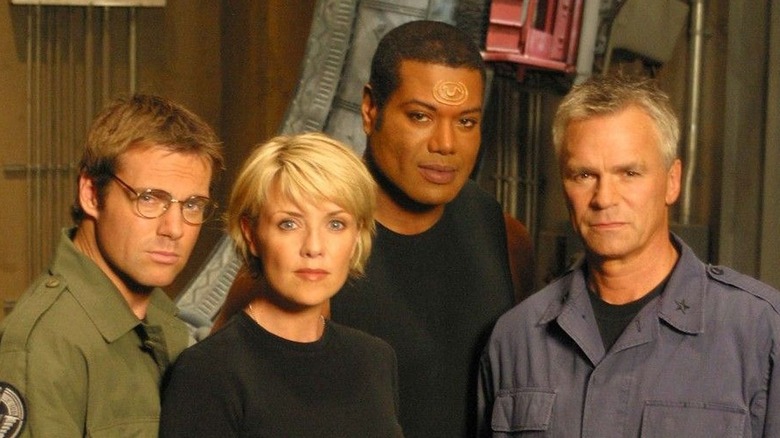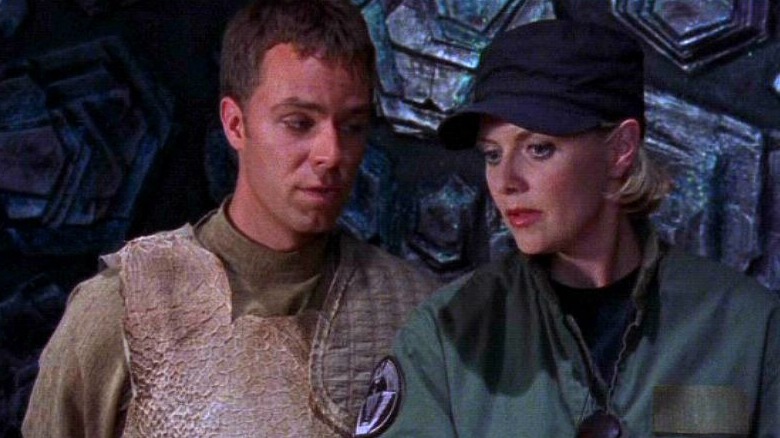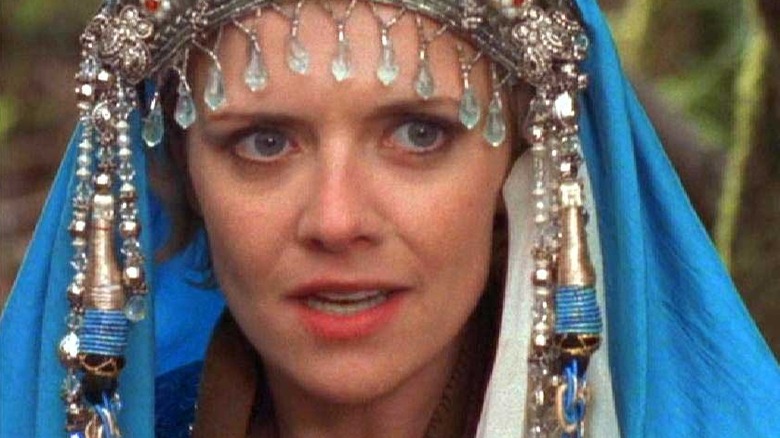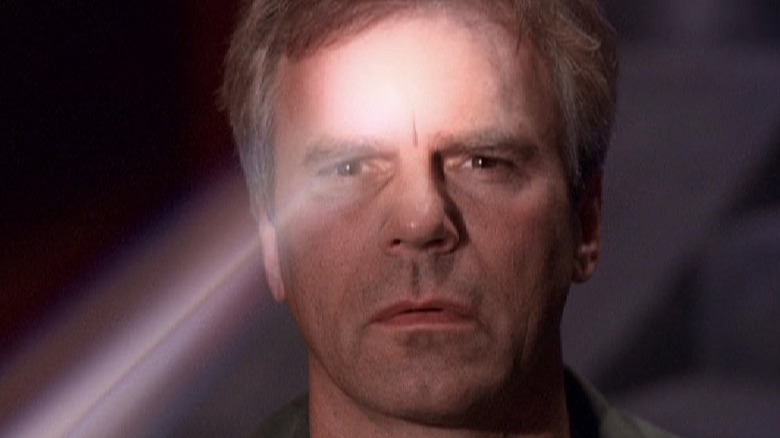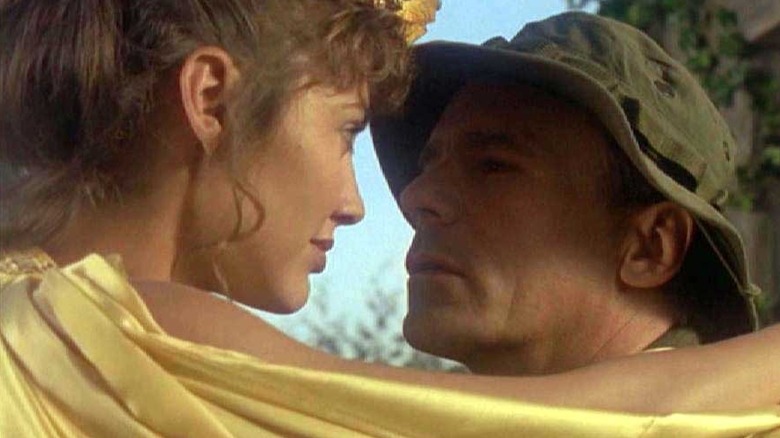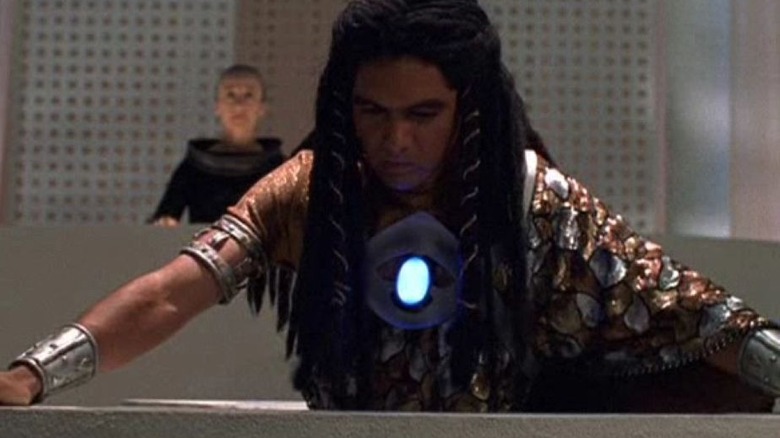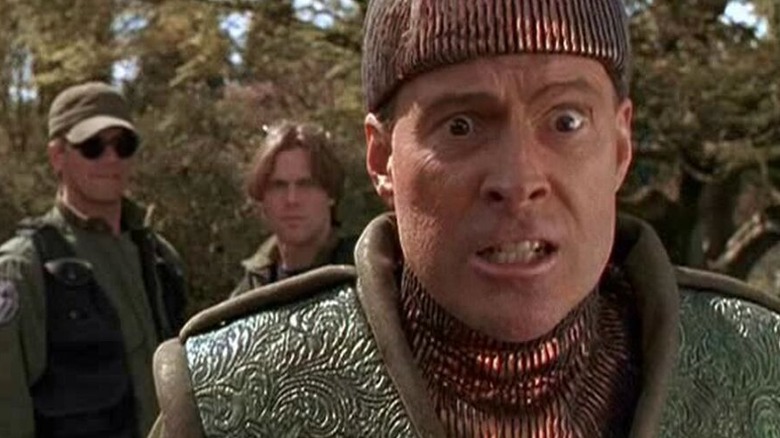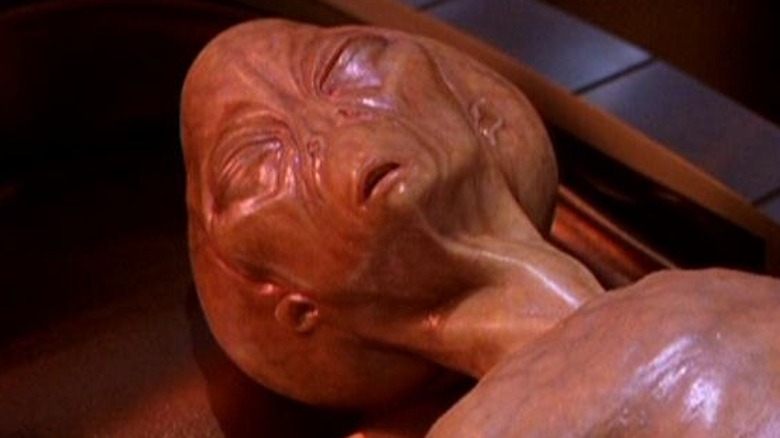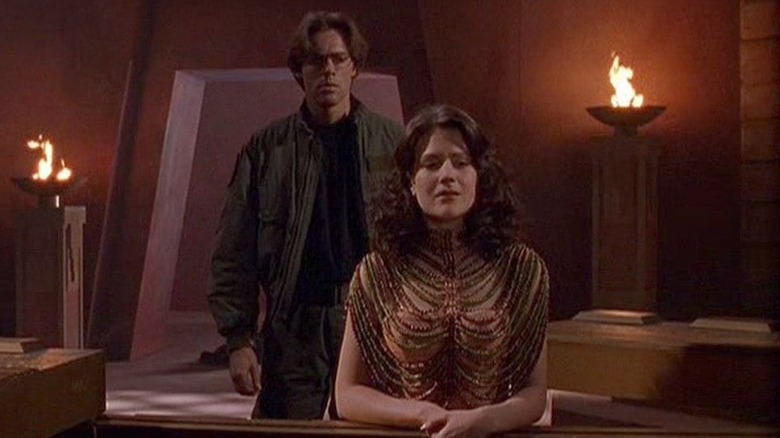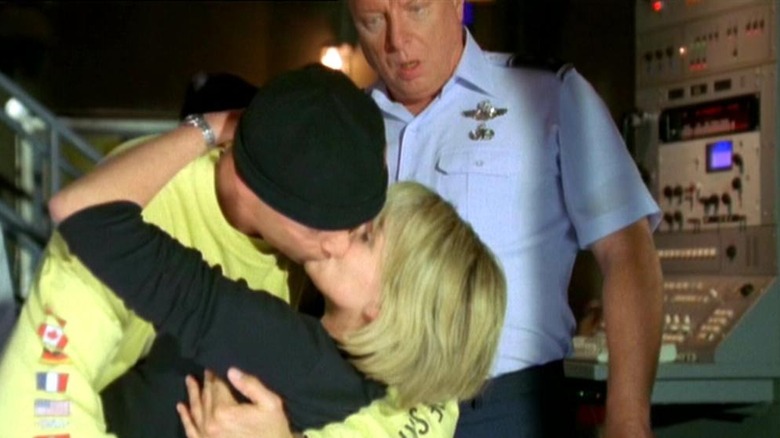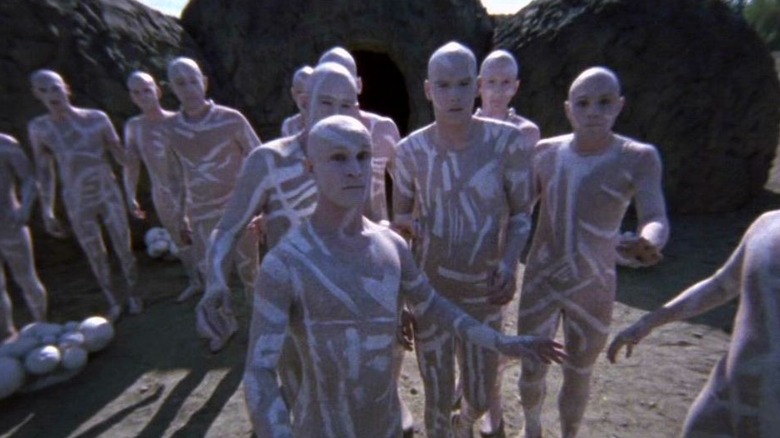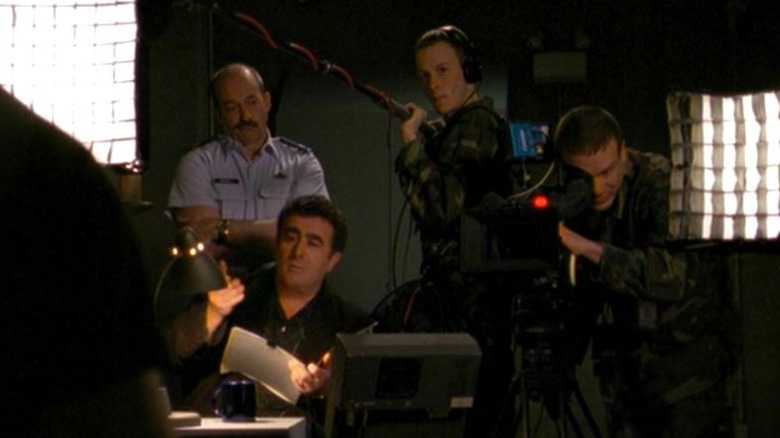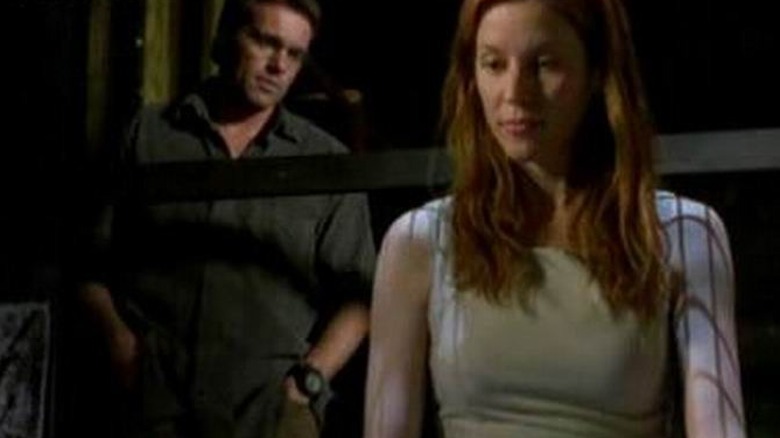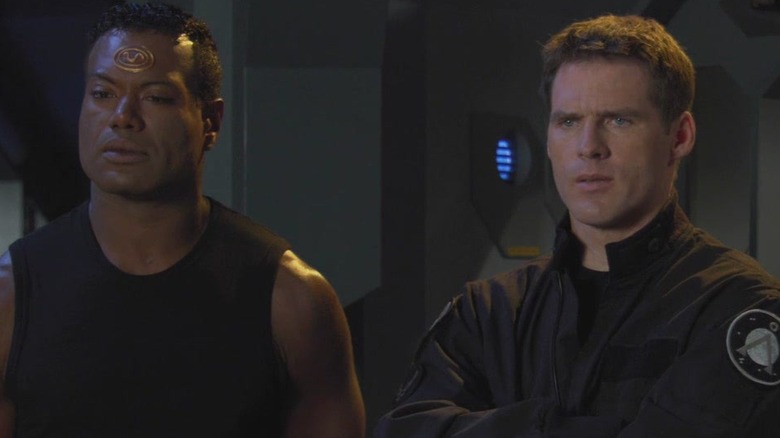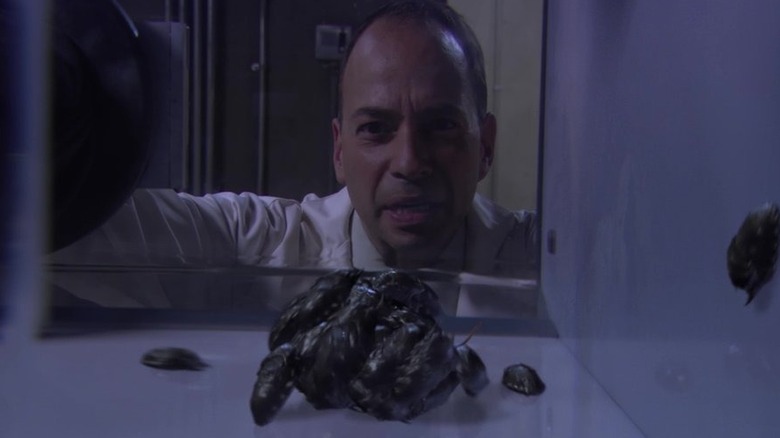The 7 Best And 7 Worst Episodes Of Stargate SG-1
Based on a 1994 sci-fi film starring Kurt Russell and James Spader, "Stargate SG-1" has become a cult sci-fi TV staple right alongside shows like "Farscape" and "Battlestar Galactica." "SG-1" ran for 10 seasons, spawning multiple TV movies and several spin-offs with varying degrees of success. A show like "Stargate" is not so actively plot-driven as it is a freak-of-the-week procedural which builds on its own mythology until everything seems like a bit of a reference to a past event or episode. Thus, it's very easy to look at most episodes of the show as single entities which sit on a wide quality spectrum from excellent to cringe-worthy.
Some "SG-1" episodes are clear tributes to perennial sci-fi tropes, while others are interesting subversions of both the show's own formula and sci-fi in general. "Stargate" is beloved by many because of its lovable characters, unique mythology, reliable bouts of humor, and the fact that it's just so much fun to watch. That said, some episodes are more skippable than others. Here are the best and worst episodes of "Stargate SG-1."
Best: The Tok'ra Part 1 & 2
"The Tok'ra, Part 1" and "The Tok'ra, Part 2" are among the best "Stargate SG-1" episodes not only for the usual things (like an engaging plot and a rare glimpse into Sam's personal life), but also because it introduces us to the Tok'ra. One of Stargate Command's most crucial allies throughout the show, the Tok'ra represent a huge expansion into the mythology of perennial bad-guy species the Goa'uld. Up until Sam's mysterious possession by the Tok'ra Jolinar in Episode 2 of Season 2, and the introduction of all of the Tok'ra in this episode, humanity had only encountered the Goa'uld species as a group of tyrannical, ruthless scavengers who enslaved humans and jaffa across the galaxy.
"Stargate SG-1" has never shied away from exploring the very uncomfortable and strange realities that come with a parasitic long-term villain, and it makes complete sense that there would be beings almost exactly like the Goa'uld who do not have the same philosophies regarding life and legacy. Combine the exploration of these questions with a heart-wrenching story about Sam's father Jacob (Carmen Argenziano, one of several "Stargate SG-1" actors who has sadly passed away) being close to death and you have an unmissable two-part episode, one that stands beautifully on its own and as an essential piece of "Stargate" canon.
Worst: Emancipation
"Stargate SG-1" Season 1 Episode 4, "Emancipation," is one of the most universally hated episodes of the show. SG-1 is a brand-new team of space explorers, which also means that the writers of the show are a brand-new team of sci-fi writers. Jack, Teal'c, Daniel, and Sam arrive on the planet Simarka through the Stargate where they find a human population with a culture very similar to the ancient Mongols. On Simarka, women have literally no rights, and Sam goes through the wringer as a result, at one point being sold as a concubine and later threatened with sexual and physical violence.
There's nothing wrong with an episode that attempts to tackle a social issue, but this one does it with very little subtlety and quite a bit of scene-chewing from guest star Cary-Hiroyuki Tagawa as a ruthless Mongol warlord. Sam is kidnapped by a lovesick teenager and it's not believable that she wouldn't be able to get out of such a ridiculous situation. The writing is clunky and does a poor job of building the stakes in a way that keeps the viewer invested in what will happen to all of the temporary characters in the episode. This episode definitely feels like an early misfire for the sci-fi behemoth.
Best: The Fifth Race
One of the most important aspects of "Stargate" mythology is the Alliance of the Four Great Races, made up of the Nox, the Furlings, the Asgard, and the Ancients. Humanity descended from the Ancients, who were also responsible for the creation of the Stargate. As a result, much of the show is about the folks of the Stargate program, led by Daniel Jackson, seeking to learn more about them. When they come upon a cache of Ancient knowledge, Colonel Jack O'Neill accidentally downloads all of its information into his mind. At first, it's helpful, but he soon becomes overwhelmed by the knowledge and reaches a point of self-regression where he can only speak the language of the Ancients.
Thankfully, all of that Ancient knowledge proves handy in solving Jack's problem and he is able to construct a device that allows him to travel to the Asgard's current home planet, where they remove the knowledge from his head. What makes this episode so special is that it provides a huge stepping stone on the path to finding out about the mysterious Ancients and gives us an incredible turn from Richard Dean Anderson. Seeing Jack come to grips with the fact that he is losing himself, despite the formidable intellect he often attempts to hide with humor, never gets old.
Worst: Brief Candle
Season 1 of "Stargate SG-1" had several questionable episodes as the show was finding its footing. One of its most ridiculous has to be "Brief Candle," in which SG-1 encounters an Ancient Grecian-esque people on a seemingly bountiful and idyllic world called Argos. After Jack pulls a full Captain Kirk and spends the night with one of the local beauties (in his defense, she did drug him a little bit), they discover that the people on Argos have been genetically modified with nanites so that their lifespans last only 100 days.
To make matters worse, the nanites are transmitted via bodily fluids, and so Jack finds himself infected and aging very fast. A lot of the emotional weight of this episode depends on investment in Jack and his relationships with the rest of SG-1, but this takes place before either of those things have been developed enough to make the audience feel the impact of Jack's looming death. The fast-aging trope is just annoying, frankly, and this episode feels like a waste of a potentially foundational story for the show.
Best: Pretense
Much like "The Tok'ra, Part 1" and "The Tok'ra, Part 2," "Pretense" is an episode that takes time to explore the nature of the Goa'uld and what their species is or is not owed due to the form they take. Skaara (possessed by the Goa'uld Klorel), Sha're's brother and O'Neill's friend, is found and arrested by the Tollan, who then put Klorel on trial for his crimes as the son of Apophis, specifically the crime of possessing Skaara's body. Jack and Daniel are summoned to act as Skaara's legal representatives, and the Nox woman Lya is called to be an impartial judge in the trial.
Zipacna, Klorel's representative, makes uncomfortably well-argued points, and because Lya is actually impartial regarding the Goa'uld (as we come to understand in the Season 1 episode "The Nox"), it is not clear how the trial will turn out. Will Skaara be allowed to regain complete control over his own body and mind? Or will he be forced to share himself with Klorel? It's an interesting episode, and it isn't just a think piece — it's full of the twists and the action audiences love about "Stargate SG-1."
Worst: The Gamekeeper
In "The Gamekeeper," SG-1 arrives on a lush, seemingly empty planet where their consciousnesses are hijacked and their memories are used by a man called the Keeper to entertain the planet's population within a virtual reality. Jack and Teal'c are forced to relive a violent East Berlin mission in Jack's past and Daniel must relive the accidental and sudden deaths of his parents. Both Jack and Daniel have had a lot of character development by this point in the show, and the whole episode seems like a missed opportunity to learn more about Sam and Teal'c's pasts.
Jack and Daniel are reliving the same events over and over, and even though the episode is only about 43 minutes long, it becomes tedious very quickly. Not to mention the fact that the Keeper has literally kept his entire species in stasis for years and years beyond what is necessary in order to prevent them from picking the flowers in his garden, which is pretty narcissistic and obsessive considering he doesn't face any consequences for having done it.
Best: Nemesis
The Replicators are one of three major long-term antagonist species in the series, and "Nemesis" is their introduction to SG-1 and humanity. Thor, an Asgardian who has aided SG-1 in the past, beams Jack aboard his spaceship. Jack finds that Thor is gravely injured and the vessel is overrun with Replicators, a species so powerful they are winning a war against one of the most advanced civilizations to come from the Milky Way galaxy.
Thor is desperate for help, and thanks to the ingenuity and relatively simple nature of human tactics and technology, Jack and the rest of SG-1 are able to provide it. It's exciting to watch the Asgard struggle and require humanity's help for a change, and Jack, Sam, and Teal'c are all in particularly fine form as they do what they do best (Sam does smart person things and Jack and Teal'c make some noise). Plus, it's honestly not so bad to have a bit of a break from Daniel's often skewed priorities as he is grounded in the hospital for most of the episode.
Worst: Need
The second in a one-two punch of irritating episodes from Season 2 (the first being "The Gamekeeper"), "Need" centers on Daniel after he prevents a young woman named Shyla from taking her own life on an SG-1 mission to a new planet, P3R-636. SG-1 is forced into labor in the Naquadah mines that sustain the planet while Shyla rescues Daniel and chooses him as her betrothed. Shyla is a princess and her father is masquerading as a Goa'uld lord in order to maintain control over the planet's people.
Shyla manipulates Daniel into repeated use of the Sarcophagus and it soon becomes clear that Daniel is becoming less and less like himself. While this episode does help us learn that sustained use of the Goa'uld Sarcophagus drives the user insane, it is otherwise a frustrating tale that centers once again on Daniel (or Jack) and an alien damsel who has become immediately obsessed with him. It's a trope that's already tired here, and it's only the beginning of Season 2.
Best: Window of Opportunity
"Window of Opportunity" is the perfect balance between humor and emotional impact. SG-1, Stargate Command, and all of Earth fall into an infinite time loop wherein everyone is living the same day over and over again. The only people who are aware that this is going on are Jack and Teal'c, and both Richard Dean Anderson and Christopher Judge get to flex some excellent comedic skills in this episode.
After trying to fix the problem for a while, Jack and Teal'c realize (thanks to Daniel) that they can do whatever they want during the loop without fear of consequences. This of course leads to a montage of Stargate golf, on-site pottery, and resignation-enabled make-outs that elicit some very funny reactions from everyone who is not Jack or Teal'c. Ultimately, the episode reaches a different level of raw emotion when Jack solves the cause of the time loop by relating the story of his son's accidental death, talking about it more in this episode than almost any other before it, which makes "Window of Opportunity" a particularly great showcase of Jack's trauma and emotional resilience.
Worst: One False Step
Along with "Emancipation," "One False Step" is widely regarded as one of the worst episodes of "Stargate SG-1." SG-1 is sent to the planet PJ2-445 in pursuit of a broken Unmanned Aerial Vehicle that was previously sent through to gather information about the aforementioned world. The team arrives to find a strange alien species who are nonverbal and who start to fall ill shortly after SG-1's arrival. This episode is like a plane forever taxiing on a runway and never taking lift off — you can watch the entire thing and still feel like you're waiting for something more significant and interesting to happen.
The aliens are costumed in silly-looking bodysuits and make-up and the episode doesn't really convey a message about eco-consciousness that is clear enough to have an effect, even after it becomes clear that humanity interfered with a symbiotic Flora-Fauna relationship. There is basically no character development for the main cast and hardly any intertextuality with the rest of the series. It feels like an over-conceptual episode of "The Twilight Zone" and the original "Star Trek" came together to birth a boring, forgettable episode of an otherwise very fun show.
Best: Heroes Part 1 & 2
The documentary-style episode on a long-running TV show is usually hit-or-miss, either serving as an annoying distraction from the plot that viewers want to follow or providing a really rich and fresh lens through which to view the show's characters and mechanisms. Thanks to the impeccable acting of Saul Rubinek — he finds the perfect balance between relatable and irritating — and the episode's impactful emotional conclusion, the two-parter "Heroes" is a great watch.
It's interesting to see how every member of the regular cast handles the presence of the film crew, from Teal'c's refusal to speak to Sam's nervous rambling. It's also interesting to have both more of an inside and more of an outside perspective on the happenings of the Stargate program than we've ever had before. Ultimately though, it's the death of Dr. Frasier, a long-time series regular guest star (who was in more than 70 episodes of the show) that makes "Heroes" one of the best "Stargate SG-1" episodes of all time. She was a quietly integral member of the team, and while her death is sad and the result of a new network attempting to garner hype, Dr. Frasier still receives a beautiful send-off.
Worst: Resurrection
The National Intelligence Department (NID) is not only the bane of Stargate Command's existence but also that of most "Stargate SG-1" viewers. Most NID episodes are frustrating to watch because the rogue factions of humanity that continue to interfere negatively with Stargate Command's very successful work just don't seem well thought out. Is it really necessary to undermine a program that has successfully defended the safety of Earth against stacked odds dozens of times by this point?
This NID plot just comes off like child's play when compared to the galactic threats that the SGC is usually facing, and combining that with another Daniel/damsel relationship, another unethical mad scientist, and a lot of dark rooms with no Stargate leads to one of Stargate's least successful episodes, "Resurrection." The SGC raids a National Intelligence Department lab and find that a brilliant, sociopathic scientist has been experimenting to create a Goa'uld/human hybrid species. It's a weird episode with unoriginal stakes (another Naquadah bomb, really?) and the weakest link in an otherwise very strong Season 7.
Best: Unending
While the series finale of "Stargate SG-1" left many feeling bereft and cheated when it came out, the episode has aged well and actually feels like a better end to the series than a conclusion of the conflict with the Ori would have been (don't worry, there are TV movies that wrap up all of that leftover plot). The episode is a character study of the final iteration of the core cast, which includes Sam, Daniel, Teal'c, Vala, Colonel Cameron Mitchell, and General Hank Landry.
After recovering the legacy of the Asgard, who proved unable to prevent the genetic degradation of their species, SG-1 and General Landry encounter Ori warships while aboard The Odyssey. Several complications later, the team is stuck in a time dilation field, where they have decades to figure out a solution to their urgent problem. It's fascinating to see where the writers take each character under these circumstances, from Vala and Daniel's heartfelt relationship to Sam's embrace of the time she's never had before. The fact that, in the end, Teal'c is the only person who remembers a second of it feels exactly right, given his role as the ever-observant (but still emotionally fleshed out) sentinel in SG-1.
Worst: The Scourge
Sometimes, a show like "Stargate SG-1" reaches a point where it has tipped the balance between hope and despair for the audience in watching the protagonists fight an overpowered enemy. The later seasons of the show saw SG-1 and Stargate Command in a war with the Ori, another race of ascended beings who, unlike the Ancients, seek to use their immense power to subjugate galaxies. The Ori and their brainwashing acolytes the Priors are already spooky and certainly the most formidable evil SG-1 has ever faced, so did the writers really need to throw a carnivorous swarm of super-powerful bugs into the Ori's already stacked arsenal? No, they did not, and this episode is just gross and horrific with very little pay-off.
The Ori originally conceived of the Scourge bugs in order to retaliate against planets that refused to bow down to them. The Scourge was designed to destroy all of the flora on any given planet, leading to a barren landscape. At Earth's off-planet gamma site, scientists starve the bugs in order to study them, only to find that the bugs have adapted to a point where they can also feed on any organic material, including humans. SG-1 of course ends up having to deal with them, but they never really find a way to stop the bugs, they just find a way to escape. Don't watch this episode if you have a bug phobia and want to sleep tonight.
